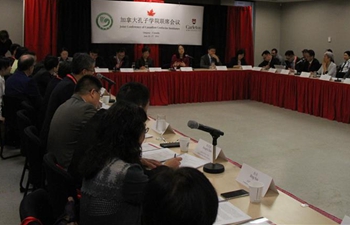SAN FRANCISCO, June 28 (Xinhua) -- A city in the U.S. northwest state of Washington is struggling to continue its program of offering recycling services to its residents, amid a tougher challenge from China's ban on imports of wastes from the United States.
Like many other U.S. cities, the city of SeaTac in the suburb of Seattle, the largest city in Washington, is feeling the squeeze of the Chinese restrictions on the imports of U.S. wastes, according to an online report posted Wednesday on WestsideSeattle.com.
On Jan. 1, 2018, China started to implement the "National Sword" policy, which bans 24 types of solid waste, including plastics and mixed papers, and sets a tougher standard for contamination levels.
The new measure dealt a big blow to the city's recycling sector represented by the solid-waste company called Recology, which has previously been doing a "great" job in providing low-cost recycling services to its residents, the report quoted city councilmembers as saying.
Recology complained that it is losing money from the Chinese policy and wants to renegotiate the contract with city authorities.
SeaTac City Councilmember Peter Kwon said the private recycling company has already a contract in place to guarantee low rates for SeaTac residents.
"We are now considering the possibility to amend that or provide a temporary surcharge until the situation with recycling improves," he said.
City councilmembers have held a meeting with Recology representatives to discuss how to help the company sustain its recycling program.
"We don't want the companies to go out of businesses because then we can't recycle at all," Kwon said, adding that they have instructed the SeaTac city council to "explore all possible options."
Recycling companies in Washington have been experiencing a hard time in keeping their business profitable since China announced the waste ban last year.
A report of Minnesota-based Public Radio International (PRI) said China consumed 55 percent of the world's scrap paper and had remained a major destination for other recyclables until early this year.
Before the China ban took effect, about 4,000 shipping containers of recyclables were exported from the United States to China every day, the PRI said.













